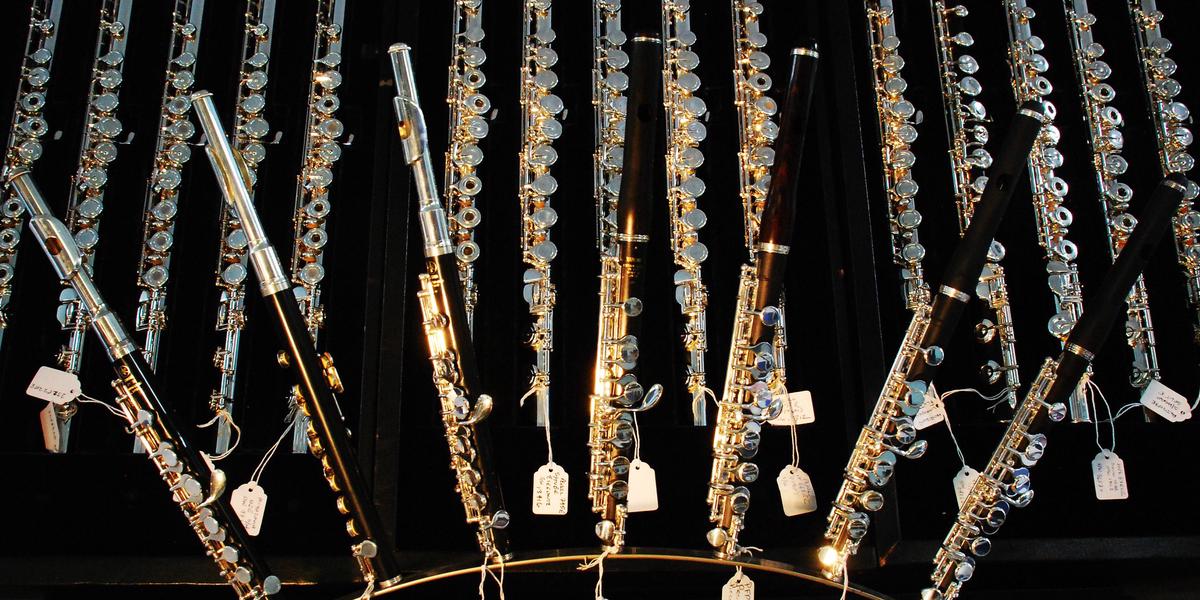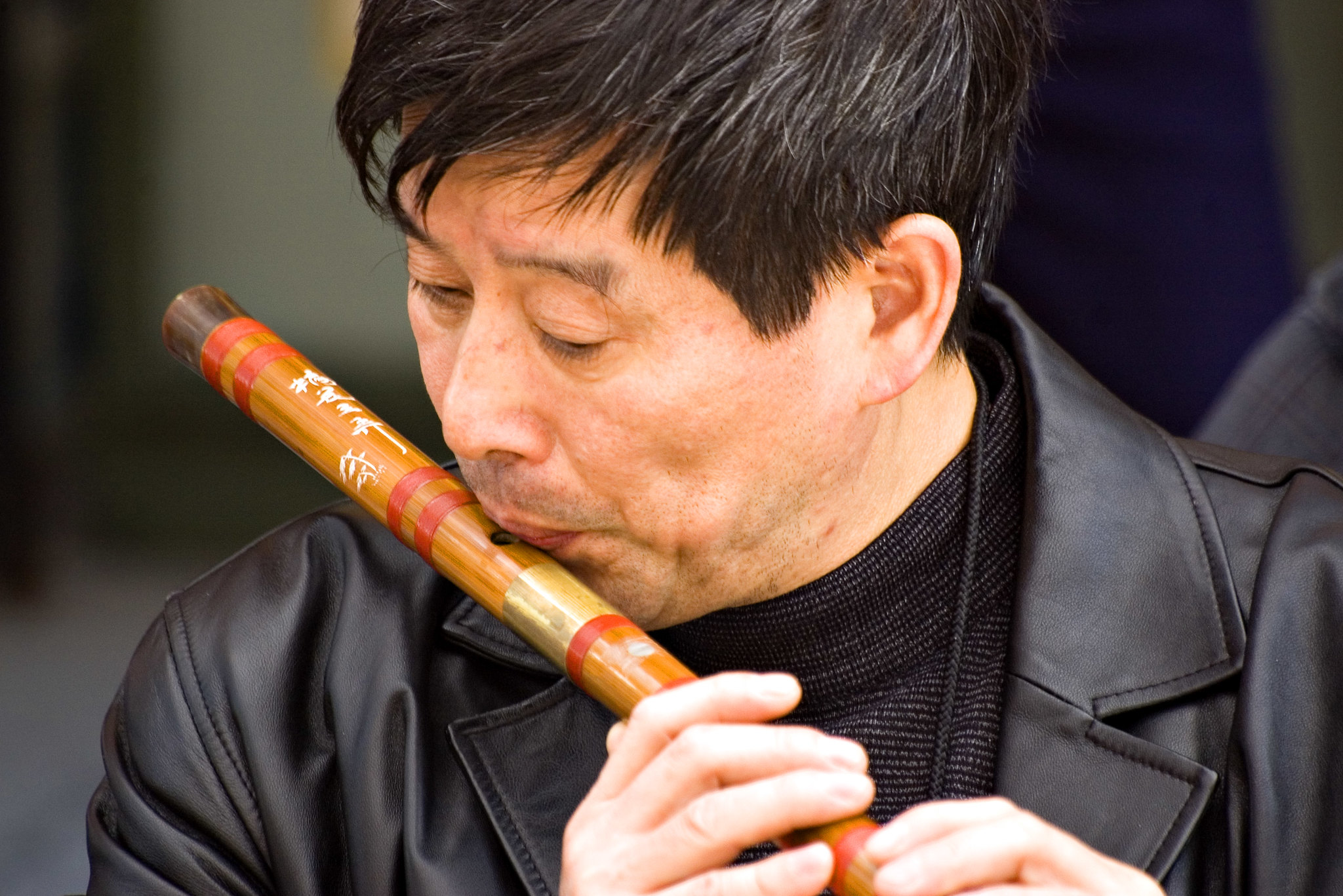There are dozens of flute brands in the world. While we cannot provide an exhaustive list, we hope that the information below will guide you on your journey to understanding the major makers in the industry. The list below is presented in no particular order of quality or preference.
Gemeinhardt
The Gemeinhardt company was founded in 1948, originally only making handcrafted flutes for professional musicians. However, the name has become well known in the flute world as making flutes for all levels of players. Crafting quality student model flutes became the company's bread and butter, and they still capture a large portion of the student market. I began studying flute in middle school, and my first instrument was a Gemeinhardt.
Gemeinhardt has a unique pedigree, in that it was founded by Kurt Gemeinhardt, whose father was a flute maker, trained by Emil Rittershausen. Now, you would not be familiar with that name, but Rittershausen was trained by Theobald Boehm, the creator of the modern flute keying system.
Gemeinhardt is currently owned by Angel Industries Co. Ltd of Taiwan. As part of this partnership, Gemeinhardt typically manufactures flute components at its headquarters in Elkhart, Indiana, and then ships them to Angel Industries to assemble them. The flutes are then returned to Indiana for test and adjustment before being sold.
They produce a standard silver-plated, closed-hole flute that is perfect for a beginning musician.
Greg Patillo, world-renowned beatboxing flutist, plays on a Gemeinhardt flute, and even has a special headjoint produced by Gemeinhardt which is presumably better for beatboxing. This is an option that can come with certain student model flutes.
Di Zhao
Di Zhao is a new for me, as they were founded in 2006, with a goal of producing the best student model flutes in the world. Di Zhao took their knowledge from some of the finest flute makers in Boston and combined them with some of the best modern production techniques to become one of the up-and-coming companies in the flute business.
Di Zhao is an accomplished flutist, graduating from the Wuhan Conservatory. His experience and training led him to hold posts with Burkart and Powell flutes. He left his post of Vice President of Quality at the Haynes company (company formed from Haynes Flute Company with Qian Ni of Eastman Strings) to form his own flute company in 2006. Thus, Di Zhao Flutes was born. Di Zhao holds offices in Westford, MA and Tianjin, China. The majority of the flutes are handmade and assembled in Jingzhou, China.
Di Zhao has a range of flutes, but they are mostly known for their student models, of which they have several. They have also adapted their manufacturing techniques to produce everything from piccolos to contrabass flutes.
Jupiter
Jupiter is another great selection of student and lower-level intermediate flutes. The company’s mission is to support music education with reliable instruments, and reliable they are. I have had my Jupiter flute for decades and it still performs reliably every time I take it out of the case.
Do not be put off by Jupiter’s wide range of instruments, producing student instruments across the entire band. Their flute models are treated with just as much care as any flute maker.
There is a great student model open hole flute if you are looking for a step up. Also, interestingly enough, they have an alternate solution to those whose arms cannot comfortably reach the keys. Typically this is handled with a curved head joint (which they do offer), but they do have waveline model which allows for arms to be in a more rested position.
Jupiter also makes great, reliable piccolo, alto, and bass flutes.
Yamaha
Yamaha is a well-respected manufacturer of instruments across the entire musical world. Yamaha began building instruments in 1887, and their decades of experience making instruments is showcased in the reliable construction of their instruments. Yamaha produces solid instruments, and are perfect for any player. They are one of the more expensive student model flutes, but they are one of the best. Yamaha produces a line of professional model flutes as well, in silver, gold, and wood. They also make piccolos, as well as alto and bass flutes.
Miyazawa
Miyazawa Flutes are some of the most renowned professional level instruments on the market. Founded in 1969 by Masashi Miyazawa, the company continues to provide some of the highest quality in craftsmanship and innovation.
Many flutists know that the headjoint can be one of the most crucial pieces of the flute that can affect the overall tone and feel of the instrument, and Miyazawa has a handful of headjoints that can be mix and matched with their flutes, or any flutes. When I was seeking an upgrade to my Jupiter flute, after much testing, I ended up with a Miyazawa headjoint, which I still play on today.
Pearl
Founded in 1946 in Post-WWII Japan, Pearl is one of the most well-established flute manufacturers in the world, and also probably the only brand to operate successfully in both the student and professional space. Operating out of Chiba, Japan, Pearl has a vast line of flutes from their Quantz and Quantz Jr. models for young players through their Hand Crafted Maesta models.
There are many professional flutists who regularly perform on Pearl flutes, including Ned McGowan (low flute specialist) and the Grammy Award-winning Rhonda Larson.
Powell
Powell flutes is another flute company with a long history, and have been endorsed by many flutists as “the very best a flutist could play.” Established in 1926 in downtown Boston, Powell flutes has become an industry leader in professional quality instruments.
Powell flutes have some unique firsts, including the first company to make 19.5K Rose Gold, the first to develop the fusion technology to create Aurumite, and the first and only handmade flute to be played in Space.
Over the years, they expanded their line to include the Powell Sonaré, which is a line of semi-professional flutes that make a good transition instrument. Somewhat unique to Powell among the major flute makers is the variety of materials that they can use to build flutes. Their handmade custom line includes everything from 18K Rose Gold, Platinum, Grenadilla Wood, Aurumite (a unique blending of silver and gold), and Sterling Silver. They also make a very respected line of Piccolos.
Powell maintains its independence as a flute maker, but the company was purchased by Buffet Crampon in 2016, joining a large group of elite wind instrument manufacturers.
Altus
Altus flutes was founded by Shuichi Tanaka, a student of Toshio Takahashi. Many flutists are familiar with the compositions of Takahashi, and Tanaka’s education under this modern master of the flute helped him develop an appreciation for the mechanical needs of the flute and flutists.
Tanaka, inspired by the British flutist William Bennett and the vintage flutes of Louis Lot, Tanaka built the first Altus flute in 1981. Altus continues to make flutes at his
Altus flutes are all handcrafted and are all categorized as professional model flutes, but some models are commercially available at major instrument dealers. On the low end of their line is the Altus 807, which could be classified as a high-end intermediate model.
For anyone who has looked at our article on the flute family, Altus does a Flute D’Amore (available in Bb and A) as part of their standard models, which is quite unique.
William Bennett is perhaps the most famous flutist who plays on an Altus model, but many principal flutists in orchestras across the world choose Altus as their flute of choice.
Brands to Watch Out For
Let’s be honest. Any person seeking a flute on a budget will likely run across a litany of brands that are… less than stellar. Best recommendation is to not buy an instrument from a company that is not an instrument dealer. Amazon is not a reliable place to buy a flute from. Nor is Walmart, Target, or Best Buy. Stick to dedicated flute vendors or band instrument stores.
Brands such as Cecilio, Eastar, and Glory are just not worth it. If the flute is blue (or pink or any other non-silver or non-gold color), then it’s probably bad.
What makes them bad? Poor construction causing bad intonation and short life span. They may be difficult to play or impossible to repair. They are more of a novelty than anything else. If a flute is less than $500, then you should seriously consider if it's going to be worth it. Over time it will likely be more of a headache than it's worth.
Conclusion
As I said before, this list is not exhaustive by any means. There are dozens of custom flute builders that all deserve attention of their own, and perhaps we can provide that over time. Flutists shopping around for a new flute should look for a company that provides trials via mail, or attend one of the many flute conventions where dealers will allow flutists to try out different instruments, headjoints, and the link.




